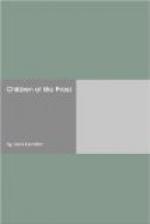Thom raised the skin-flap of her father’s lodge. Two men sat with him, and the three looked at her with swift interest. But her face betokened nothing as she entered and took seat quietly, without speech. Tantlatch drummed with his knuckles on a spear-heft across his knees, and gazed idly along the path of a sun-ray which pierced a lacing-hole and flung a glittering track across the murky atmosphere of the lodge. To his right, at his shoulder, crouched Chugungatte, the shaman. Both were old men, and the weariness of many years brooded in their eyes. But opposite them sat Keen, a young man and chief favorite in the tribe. He was quick and alert of movement, and his black eyes flashed from face to face in ceaseless scrutiny and challenge.
Silence reigned in the place. Now and again camp noises penetrated, and from the distance, faint and far, like the shadows of voices, came the wrangling of boys in thin shrill tones. A dog thrust his head into the entrance and blinked wolfishly at them for a space, the slaver dripping from his ivory-white fangs. After a time he growled tentatively, and then, awed by the immobility of the human figures, lowered his head and grovelled away backward. Tantlatch glanced apathetically at his daughter.
“And thy man, how is it with him and thee?”
“He sings strange songs,” Thom made answer, “and there is a new look on his face.”
“So? He hath spoken?”
“Nay, but there is a new look on his face, a new light in his eyes, and with the New-Comer he sits by the fire, and they talk and talk, and the talk is without end.”
Chugungatte whispered in his master’s ear, and Keen leaned forward from his hips.
“There be something calling him from afar,” she went on, “and he seems to sit and listen, and to answer, singing, in his own people’s tongue.”
Again Chugungatte whispered and Keen leaned forward, and Thom held her speech till her father nodded his head that she might proceed.
“It be known to thee, O Tantlatch, that the wild goose and the swan and the little ringed duck be born here in the low-lying lands. It be known that they go away before the face of the frost to unknown places. And it be known, likewise, that always do they return when the sun is in the land and the waterways are free. Always do they return to where they were born, that new life may go forth. The land calls to them and they come. And now there is another land that calls, and it is calling to my man,—the land where he was born,—and he hath it in mind to answer the call. Yet is he my man. Before all women is he my man.”
“Is it well, Tantlatch? Is it well?” Chugungatte demanded, with the hint of menace in his voice.
“Ay, it is well!” Keen cried boldly. “The land calls to its children, and all lands call their children home again. As the wild goose and the swan and the little ringed duck are called, so is called this Stranger Man who has lingered with us and who now must go. Also there be the call of kind. The goose mates with the goose, nor does the swan mate with the little ringed duck. It is not well that the swan should mate with the little ringed duck. Nor is it well that stranger men should mate with the women of our villages. Wherefore I say the man should go, to his own kind, in his own land.”




